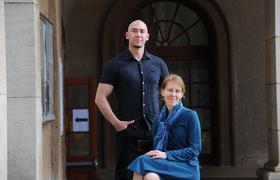Flourish First programme designed to boost students’ academic performance
21 July 2023 | Story Helen Swingler. Photo Lerato Maduna. Read time 3 min.
The University of Cape Town’s (UCT) Residence Life Division in the Department of Student Affairs has launched “Flourish First: A Week of PERMA-nent Growth”, a programme to enhance students’ well-being and help each one to realise their potential as scholars and individuals.
Led by Sean Abrahams, a PHD candidate in the division, the transformative programme is designed to unlock students’ full potential within the unique context of university life.
“Flourish First” is a self-paced programme that runs from 24 to 31 July, and requires only five minutes of daily reflection. Its launch has been timed to coincide with the start of UCT’s second semester, which leads to the crucial examination period.
Twice a day, participating students will receive well-researched, evidence-based and inspiring input to guide them on their “flourishing journey”, said Abrahams.
“By prioritising their well-being, students can align their university experience with the principles of flourishing, and create a vibrant, fulfilling academic journey.”
Backed by extensive meta-analytic research, “Flourish First” explores the six essential elements of the PERMA model: positivity, engagement, relationships, meaning, accomplishment – and health, Abrahams explained.
“This empowers students to discover practical ways to integrate these elements into their academic pursuits, student relationships, and personal fulfilment.”
By immersing themselves in daily reflections tailored to the university context, participants will learn to thrive amid the challenges and opportunities that arise during their academic journey.
The programme’s foundations lie in the work of Dr Martin Seligman’s PERMA theory of well-being. Dr Seligman is an American psychologist, educator, researcher and author, and the “father of positive psychology”.
Seligman was the director of the University of Pennsylvania’s clinical training programme for 14 years. His work centred on learned helplessness, positive psychology, depression, resilience, optimism and pessimism.
Align journeys and values
Throughout the week-long programme, students will explore these elements and learn how to increase positive emotion, achieve engagement through ‘flow’ experiences, foster meaningful relationships, find purpose, and pursue accomplishments for their own sake.
“The programme emphasises that different individuals derive well-being from these elements to varying degrees, allowing participating students to align their journey with their values and interests,” noted Abrahams.
“UCT believes that well-being is not only valuable because it feels good, but also because it has real-world consequences.
“UCT believes that well-being is not only valuable because it feels good, but also because it has real-world consequences. Research has shown that individuals with higher levels of well-being perform better academically, have more satisfying relationships, are more cooperative, and have better physical and mental health outcomes.”
Abrahams said that the week-long programme is well aligned with the institutional applications of well-being.
“UCT aims to educate students for both academic success and flourishing. This programme provides students with the necessary skills to thrive, equipping them for the challenges they may encounter during their university journey.
In a final word of encouragement, Abrahams urged students to sign up.
“Prepare to embrace the upcoming term with a renewed focus on flourishing.”
Sign up to participate in the “Flourish First: A Week of PERMA-nent Growth” programme.
 This work is licensed under a Creative Commons Attribution-NoDerivatives 4.0 International License.
This work is licensed under a Creative Commons Attribution-NoDerivatives 4.0 International License.
Please view the republishing articles page for more information.










